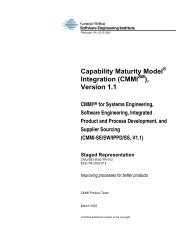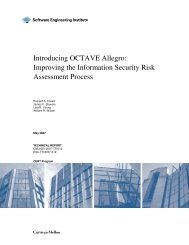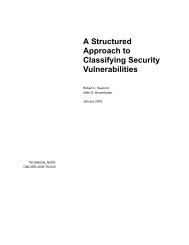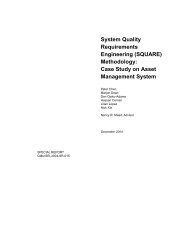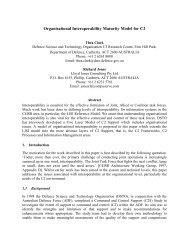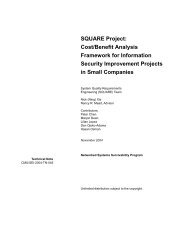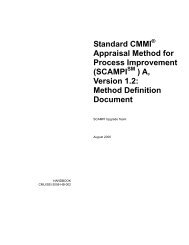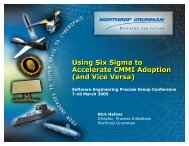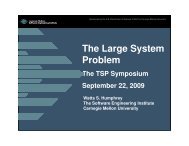State of the Practice of Computer Security Incident Response Teams ...
State of the Practice of Computer Security Incident Response Teams ...
State of the Practice of Computer Security Incident Response Teams ...
You also want an ePaper? Increase the reach of your titles
YUMPU automatically turns print PDFs into web optimized ePapers that Google loves.
tended team is formed by temporarily adding on o<strong>the</strong>r pr<strong>of</strong>essionals or specialists depending<br />
on <strong>the</strong> type <strong>of</strong> activity and type <strong>of</strong> response and analysis required.<br />
The list that follows provides a more detailed sample <strong>of</strong> <strong>the</strong> types <strong>of</strong> staffing and tasks related<br />
to positions that might be part <strong>of</strong> a core and extended CSIRT. A review <strong>of</strong> <strong>the</strong> CSIRT literature<br />
and discussions with o<strong>the</strong>r teams about <strong>the</strong>ir organizational structure show that <strong>the</strong>se are<br />
common types <strong>of</strong> positions in CSIRTs. It should be pointed out, however, that not all teams<br />
would have all <strong>the</strong>se positions. CSIRT staffing will depend not only on <strong>the</strong> main mission <strong>of</strong> a<br />
team, but also on <strong>the</strong> funding and expertise available in <strong>the</strong> parent organization. It will also<br />
depend on what services and capabilities are provided by o<strong>the</strong>r parts <strong>of</strong> <strong>the</strong> parent organization<br />
or constituency.<br />
A core team might include<br />
• manager or team lead<br />
− provides strategic direction<br />
− enables and facilitates work <strong>of</strong> team members<br />
− supervises team<br />
− represents CSIRT to management and o<strong>the</strong>rs<br />
− interviews and hires new team members<br />
• assistant managers, supervisors, or group leaders<br />
− provides day-to-day operational guidance for team<br />
− supports strategic direction <strong>of</strong> assigned functional area<br />
− supports <strong>the</strong> team lead as needed<br />
− provides direction and mentoring to team members<br />
− assigns tasks and duties<br />
− participates in interviews with new team members<br />
− handles management tasks in team lead’s absence<br />
• hotline, help desk, or triage staff (can also be referred to as first responders)<br />
− handle main CSIRT telephone(s) for incident or security reports<br />
− provide initial assistance, depending on skills<br />
− undertake initial data entry and <strong>the</strong> sorting and prioritizing <strong>of</strong> incoming information<br />
• incident handlers<br />
− undertake incident analysis, tracking, recording, and response<br />
− coordinate <strong>the</strong> reactive and proactive guidance that will be provided to <strong>the</strong> constituency<br />
(develop material such as documentation, checklists, best practices, and guidelines)<br />
− disseminate information<br />
− interact with <strong>the</strong> CSIRT team, external experts, and o<strong>the</strong>rs (such as sites, media, law<br />
enforcement, and legal personnel) as appropriate, by assignment from team lead or<br />
o<strong>the</strong>r management staff<br />
− undertake technology-watch activities if assigned<br />
− develop appropriate training materials (for CSIRT staff and/or <strong>the</strong> constituency)<br />
− mentor new CSIRT staff as assigned<br />
− monitor intrusion detection systems, if this service is part <strong>of</strong> <strong>the</strong> CSIRT activities<br />
74 CMU/SEI-2003-TR-001



